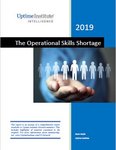I recently read yet another article that addressed the challenges facing the data center industry regarding the industry’s diminishing pool of available personnel. While the article did pay lip service to diversifying the workforce to address the growing scarcity of qualified personnel, it offered no real solutions.
The urgency of the need for diversity is not simply one of fairness and equal opportunity. It’s not hyperbolic to say that this is an existential issue for companies fighting to win the war for talent to enable them to put the right people in the right roles to be competitive today and tomorrow. Simply put, organizations that aren’t actively working to diversify their workforces run the risk of stunting their ability to grow by artificially limiting their access to talent.
Advocacy
Success requires commitment, and diversifying the data center workplace dictates the need for internal advocates to facilitate organizational change. On a recent panel spotlighting the issues facing women in the technology industry, each member of the panel shared stories they faced at key moments in their careers. One quote aptly summarized this need for internal diversity champions. Addressing the primarily male audience, Heather Dooley from Google said:
“Change does not happen on the shoulders of those who are marginalized. It happens when you—those people in power to make decisions and foster challenge—become allies and advocates.”
This quote gets to the heart of something that is critical to the issue of increasing diversity at all levels of a company: real change only happens when people in positions of influence and power take on the roles of advocates for talented women and minorities.
Why mentorship isn’t enough
Mentorship is a tremendously positive thing. Mentors are able to share relevant experience, provide advice, training and guidance. Mentors have substantial value, but too often the individuals serving in a mentoring capacity do not have influence over the career direction of those they are nurturing.
Unfortunately, mentorship without advocacy by people with influence is a recipe for preparing women and minorities for an unattainable career path. An advocate not only provides support and mentorship, but also have the level of influence to further the careers of those under their tutelage. The challenge is establishing connections between talented personnel and those in position to act as effective advocates on their behalf.
Promoting advocacy
Effective advocacy only happens when there is an organic environment where sharing and open communications can take place. Typically this level of personal interaction is best performed in alternative settings where higher level personnel are able to spend time with more junior employees. Without the personal connections facilitated by activities such as meetings, retreats, after work events and even athletic activities, advocacy cannot take root.
Events that occur outside the normal realm of day to day business activities create opportunities for women and minorities to interact with potential advocates conducive to developing the deeper level of familiarity—backgrounds, personalities and aspirations—that identifies high potential employees that otherwise would have remained hidden within the organization. These connections will lead to the kind of advocacy that will put women and minorities on upward career trajectories more effectively than any mentoring or STEM recruitment initiative.





